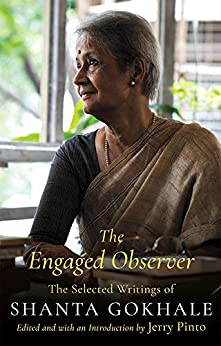‘The trouble with having everything so beautifully thought out is that if one link in the think chain snaps, you are left holding the loose ends with not half an idea between the ten of you about what to do.’ – Shanta Gokhale.
Reading works by Shanta Gokhale is a necessary journey that one needs to undertake. For oneself. Her book, The Engaged Observer, extends its meaning to take the reader into its world. The glimpses of a world, an era, and the people that shaped the world in a particular way for Gokhale have found a resting place in the pages of this book. But before one begins to read this book, it is essential to understand the mind of the one who wrote these collected pieces. Her autobiography, One Foot on the Ground: A Life Told Through the Body, should be on one’s reading list. The book opens up a world which Gokhale saw and lived through. The people and events that came and left—leaving behind remnants that have gone a long way in shaping the way Gokhale thinks and writes. It is one of those personal histories that will help a reader understand: ‘Our all-too human condition is the gift of the body we inherit.’
The Engaged Observer is a collection of fiction and non-fiction pieces that had been written over the years and published in various newspapers and journals. The non-fiction section introduces readers to the stalwarts of Marathi theatre. Tracing the roots of theatre in India Gokhale takes her readers along an interesting trail of what was happening in Maharashtra when theatre was in its nascent stage. She introduces playwrights from a close viewpoint. She describes the inner workings of the mind of a friend and a playwright during his winding up years, Satyadev Dubey, when she observes:
‘When friends asked him why he wrote continuously about himself, he said playwriting was an extremely difficult activity. It called for an understanding of others. He no longer understood others. He barely understood himself. That is why he found himself the most appropriate subject to explore and try to understand.’


Wow, superb blog layout! How lengthy have you been running a
blog for? you made blogging look easy. The total look of your
website is excellent, let alone the content
material! You can see similar here e-commerce
Hello! Do you know if they make any plugins to help with Search Engine Optimization?
I’m trying to get my blog to rank for some targeted keywords but I’m not seeing very
good results. If you know of any please share. Cheers!
You can read similar text here: Ecommerce
Hello there! Do you know if they make any plugins to help with Search Engine Optimization? I’m trying to get my site
to rank for some targeted keywords but I’m not seeing very good results.
If you know of any please share. Thank you! I saw similar text here: GSA Verified List